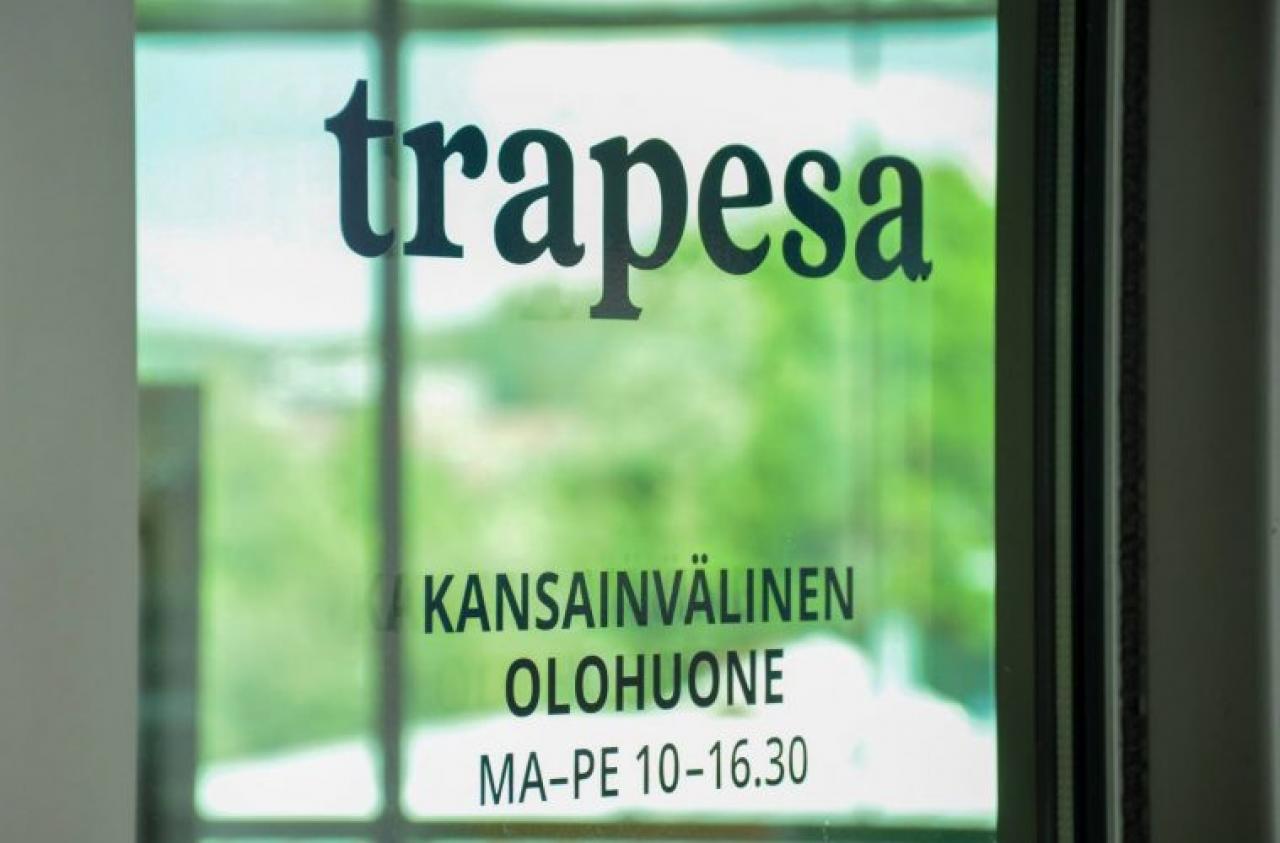
With a slogan ‘sharing and connecting’ Trapesa international meeting point offers a neutral and unbiased environment for discussions, hobbies and learning, and its doors are open to all people regardless of their nationality, mother tongue, religion and cultural background. To explore the establishment and development of Trapesa, we had an interesting conversation with Raisa Lindroos, Secretary General of Filoksenia Association that is the driving force behind Trapesa.
How to describe Trapesa, Filoksenia ry and yourself briefly? How did you come up with the idea of establishing Trapesa?
Hi, I am Raisa Lindroos, one of the co-founders of the Trapesa international meeting point and the Secretary-General of Filoksenia Association. After 15 years of being self-employed and being a consultant, I also worked as a project’s professional, a journalist and in marketing communications.
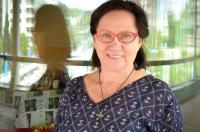
Raisa Lindroos, one of the co-founders of the Trapesa (Source: Trapesa)
In 2000, the idea of establishing Trapesa was born in our Filoksenia Association meeting. Throughout around 30 years history of Filoksenia in charity work, Trapesa is our initiative to promote tolerance and equality between different cultures in Finland. As you know, Finland is a diverse society of many languages, ages and backgrounds. Therefore, Trapesa aims to promote the equality as well as well-being in open dialogues from multicultural perspectives and to build spirit of a caring community. The ongoing task is to reduce prejudice and racism.
What kind of activities does the Trapesa organise?
In Trapesa urban living room, everyone is involved and engaged into a local network and community integration. We believe that it is easy to step over the threshold in Trapesa, to ask advice and support, for particular, psychosocial support from professionals. Everyone can try new things, make new friends through interaction, group activities and cultural events. Different art exhibitions and performances plays an important role in building community capacity and cultural experiments.
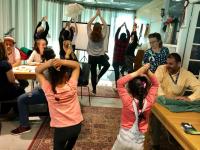
Trapesa offers different kinds of wellbeing events and groups in co-operation with local learning institutions, health care services and mental health organizations. (Source : Raisa Lindroos)
In addition, Trapesa as glass-walled space available for organizational celebrations. Located in the middle of the Espoo bustling train station, Trapesa is a place for spectacular intercultural events such as Diwali - India's popular festival of lights; Nowruz - Middle Eastern spring festivals, various catwalk shows, Europe Day as well as family celebrations like Christmas and Easter. The elderly Finnish citizens and minorities attend various celebrations of the Sámi, Roma, Karelians, Tatars and Finnish-Swedes.
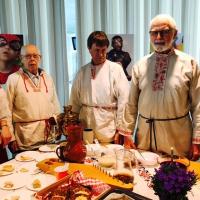
Minorities are in the heart of Trapesa’s work - like language, culture, nationality, sexuality and different perspectives of world views. Finland’s language minorities are Sami people (the only original people of Europe still alive), Roma people, Finland Swedish. Karelians (in picture) who were evacuated twice from their homestead and lost their homes in the end the second world war. (Source : Raisa Lindroos)
Trapesa and our partners organise together a wide range of events such as public lectures and discussion sessions, city events related to integration, sexual health, sustainable development and many current issues.
What are Trapesa’s recent achievements? Has Espoo residents engaged with the Trapesa?
Throughout 20-year history, Trapesa has succeeded in building a strong reputation in various multilingual communities and professional organizations. Fellow citizens always recommend Trapesa’s activities to new Espoo residents. There are different work forms, social work, counselling services and cultural work that we offer to everyone. As a long-term plan, we aim to develop new workshops constantly and involve new partners to Trapesa operation.
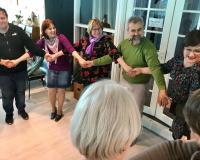
Celebrating Trapesa gives space for its volunteers to organize cultural parties. On the Europe Day people enjoyed Geek dances, Spanish paella and French wine. (Source : Raisa Lindroos)
As small and long-established organization, pop-up volunteering is always a key resource of Trapesa. Based on the multilingual and multicultural perspectives, these volunteers actively involved in brainstorming with Trapesa’s staffs, and suggest new idea for events, for example, the Scottish Village Festival, Russian Cultural Evening, Chinese Full Moon Festival, Ethiopian New Year, Mexican Day of the Dead and Intercultural Children’s Festival. Teamwork is tremendously valuable when connecting people with each other. Moreover, warmth in human relationships is often born in communal interaction. Common interests and hobbies can be found while working together.

Food parties connect different languages, religions, ages etc. Trapesa’s special tradition is that Christians offer Iftar night meal for Muslims during Ramadan. In turn Muslims offer Easter meal for Christians. (Source : Raisa Lindroos)
What are the challenges of implementing Trapesa’s activities?
Currently, the corona pandemic has brought challenges for Trapesa. The doors of Trapesa was closed in the beginning of March and we are step-by-step and carefully opening our door to community activities. In recent months, Trapesa has started the digital transition with the myriad of online tools like a virtual cafe, art groups on a zoom platform, video stories on YouTube and live streaming events. Counselling is now performed by phone. For having face-to-face meetings, we need to ensure safe distances and follow hygiene instructions.
On the other hand, we think the biggest challenge hasn’t come yet. The big picture of family dynamics, intimate partner violence and child neglect can appear during next autumn. Therefore, we are adding new different ways of working with psychological assistance, confidentiality in group therapy and stress reduction program (meditation, mindfulness, yoga, sport activities). There is also a need to work together with specialized professionals and associations to be able to build a secure network that support the residents.
What is Trapesa’s plan for the upcoming months/years? What would you like to improve in your operation?
The growth strategy of our association has been developed. We aim to develop our operations as a model for places where residents with foreign background are living or where a conflict of population groups is increasing. More psychosocial and mental services will be added to our way of working. Ongoing charity work and encountering between individuals and communities have been continued as the basis of our operation.
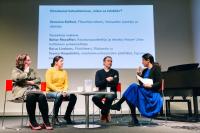
Espoo City is one of the most multicultural cities in Finland. Open discussions on success and possibilities, threats and obstacles of interaction and integration are important and meaningful. (Source : Raisa Lindroos)
In addition, professional cooperation and learning from other fields has been improved. We offer a step-by-step guide regarding to attitude, language and culture for inhabitants to solve cross-cultural challenges. We are also improving risk management and administration of our operation. Working together, we can achieve more goals. Teamwork plays a crucial role to help foster problem-solving skills, find professionals and potential cooperation with co-workers.
How long has Trapesa joined the Active NGOs project? What do you expect from the project?
The invitation to the Active NGOs project was sent to us by Maria Tiilikkala and Said Aden, two staff members of the city of Espoo and two representatives of the project in Finland. As an international project funded by the European Union, the project coordinator -Irina Vasiļjeva and Lead Expert - Levente Polyak came to visit Trapesa in 2018.
At the beginning of the project, we expected a well-designed process, motivated and interested participants as well as multi-professional leadership and management. We look forward to synergies and cooperation possibilities between Active NGOs in Espoo and different cities across the Europe. In the project, we want to learn and interact with each other in a welcoming, positive and multicultural space.
What have Trapesa and you learned from the Active NGOs project?
Active NGOs project, from our view of point, is one of the most effective and impactful European Union’s projects. We really appreciate the ongoing efforts of URBACT Transfer Network, Active NGOs project’s partners, the City of Espoo, Maria Tiilikkala and Said Aden as well as all associations in this project. Cooperation between the municipality and NGOs plus the URBACT Local Group networking are extremely valuable for all associations and Trapesa. It is a crucial opportunity to learn from experts, decision-makers and other associations to promote activities and to build effective cooperation.
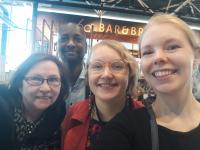
Transnational Meeting of Active NGOs project in Santa Pola (Source: Maria Tiilikkala)
During the Active NGOs project, our representatives had chance to join and learn from Transnational Seminars in Santa Pola and Dubrovnik. The project also has given me fresh perspectives, creative ideas and great individual and organizational networks. In a long-term plan, Trapesa aims to create a modern, urban and innovative environments. The good practices, presentations and materials from different cities across the Europe has encouraged and inspired us to apply models of the civic ecosystem to our own activities.
In 2020, the project faces extraordinary challenges due to the coronavirus pandemic. Even though colleagues from across the Europe could not come to Transnational seminar in June in Espoo, a digital seminar on 2 of June was held. Co-creative solutions and best practices were shared and discussed in the seminar to solve challenges during the uncertain time.
The Espoo URBACT Local Group seems to be strengthened. There are tremendous benefits from our cooperation as sharing up-to-date information and new practices, as well as building trust and true partnerships. I believe that our digital forum for Espoo ULG members is effective, especially during the coronavirus situation.
Finally - How can Active NGOs help Trapesa develop its operations in the future?
Based on the strength of the URBACT Local Group, co-creative ideas from experts and project partners from different European cities, Trapesa will apply new initiatives and models to our own operation. Our goal is to offer better services and support the well-being of Espoo residents.
Effective ways of developing a new joint working between various units and experts of the City of Espoo and associations will certainly continue. The strategy of the City of Espoo and Trapesa has common goals and operations. Other associations are also crucial and valuable resources in the synergies and cooperation possibilities to enhance services with equality, humanity and tolerance.
June 2020,
Nga Phan – Coordinator of International Affairs of the City of Espoo

